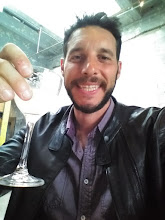The driver doesn’t give much weight of consideration to the heavy plaque, even if he could read its mocking welcome. On the bottom is a stamp of what appears to be a city council or guild.
He sizes up the building once more. It doesn’t appear to be so old as to warrant a historical marker, but he doubts to what extent bare logs can show their age. He inspects the seal a little closer before finally heading inside. On it is an engraved banner, running between a raised buffalo’s head and the smiling face of an early pioneer. The banner reads:
International Conspiracy of Travelers and Merrymakers, First and Founding Lodge
“In to….inner…inner nashnul…. consp…con piracy….Aw hell, a joke,” the driver decides without getting through the second word.
The inside is as dark and cool as could be expected from a cabin without windows in the middle of December. They make out a bar running along one wall, with a few hunched backs facing out, and take a few more steps into the chilly interior.
“Well how you boys doin’?”
A very white, powdery face, with eyes and lips painted in exaggerated clown colors, shines out of the darkness. A madam: she wears the tiered, sparkly gown of someone from the flapper era. The dress is meant to hide her figure, but both the driver and the hitchhiker can tell, even in the absence of much lighting, that she is short and stocky, with a poof of lemon-yellow hair cocked atop her head.
The hitchhiker breaks into a grin. He can already see beyond the kindly smile of the house mother and into a dark corner, where there awaits several young girls, looking at once bored and anxious. They wear colors to a similar jarring effect as their ill-attired matron, but on these girls, they are meant to draw attention to their frail bodies, not away. Their robes are skimpy and completely open, while their faces look like they have been transplanted from over-made dolls.

